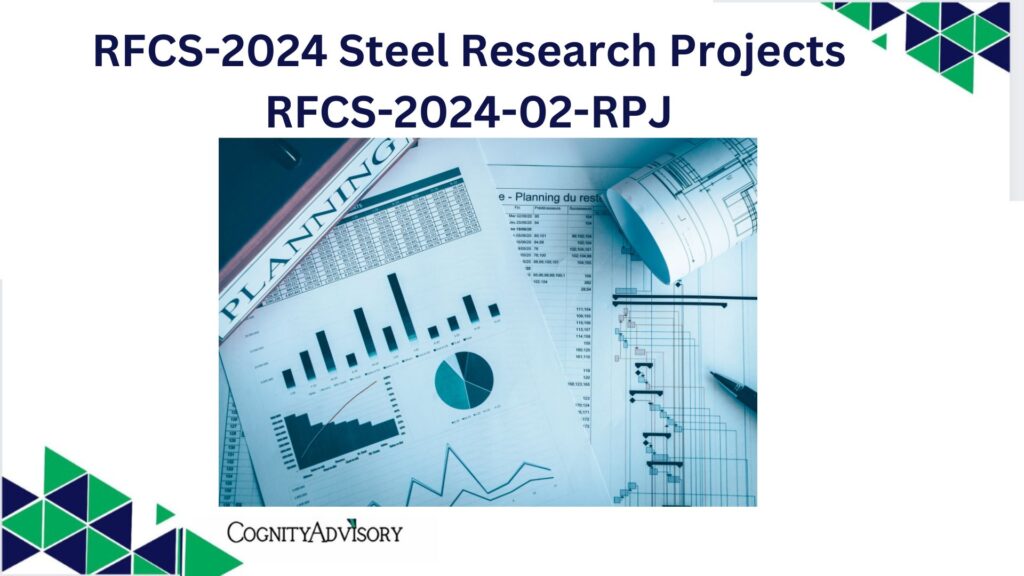RFCS-2024-02-RPJ
General information
Programme
Research Fund for Coal & Steel (RFCS)Budget overview
Call
Type of action
RFCS-PJG RFCS Project Grants
Type of MGA
RFCS Action Grant Budget-Based [RFCS-AG]
Open For Submission
Deadline model
single-stage
Opening date
18 June 2024
Deadline date
24 September 2024 17:00:00 Brussels timeTopic description
Objective:
Research objectives for steel ( Council Decision 2008/376/EC amended by Council Decision EU 2021/1094 )
Article 8 New, sustainable and low-carbon steelmaking and finishing processes
Research and technological development shall aim to develop, demonstrate and improve near-zero-carbon steel production processes with a view to raising product quality and increasing productivity. Substantially reducing emissions, energy consumption, the carbon footprint and other environmental impacts, as well as conserving resources, shall form an integral part of the activities sought. Research projects shall address one or more of the following areas:
(a) new and improved breakthrough near-zero-carbon iron- and steel-making processes and operations, with particular attention to carbon direct avoidance or smart carbon usage, or both;
(b) steel process and process chain optimisation (including the reduction and pre-reduction of iron-ore, iron- and steel-making, processes based on recycled scrap melting, secondary metallurgy, casting, rolling, finishing and coating operations) via instrumentation, detection of properties of intermediate and final products, modelling, control and automation, including digitalisation, application of big data, artificial intelligence and any other advanced technologies;
(c) steel process integration and process efficiency in near-zero-carbon steel production;
(d) maintenance and reliability of steel production tools;
(e) techniques for increasing recyclability, recycling and reuse of steel and developing a circular economy;
(f) techniques for increasing the energy efficiency of steel production by recovery of waste heat, prevention of energy losses, hybrid heating techniques and energy management solutions;
(g) innovative technologies and solutions for the iron- and steel-making processes promoting cross-sector activities, demonstration projects integrating zero-carbon energy production or contributing to a clean hydrogen economy.
Article 9 Advanced steel grades and applications
Research and technological development shall focus on meeting the requirements of steel users to develop new near-zero-carbon products and on creating new market opportunities while reducing emissions and environmental impacts. In the context of the technologies referred to in Article 8, research projects shall address one or more of the following areas, with the objective of delivering near-zero-carbon and sustainable steel production processes in the Union:
(a) new advanced steel grades;
(b) improvement of steel properties such as mechanical and physical properties, suitability for further processing, suitability for various applications and various working conditions;
(c) prolonging service life, in particular by improving the resistance of steels and steel structures to heat and corrosion, mechanical and thermal fatigue and other deteriorating effects;
(d) predictive simulation models on microstructures, mechanical properties and production processes;
(e) technologies relating to the forming, welding and joining of steel and other materials;
(f) standardisation of testing and evaluation methods;
(g) high-performance steels for applications like mobility, including sustainability, eco-design methods, retrofitting, lightweight design and safety solutions.
Article 10 Conservation of resources, protection of the environment and circular economy
In both steel production and steel utilisation, the conservation of resources, the preservation of ecosystems, the transition to a circular economy and safety issues shall form an integral part of the research and technological development work. Research projects shall address one or more of the following areas:
(a) techniques for recycling obsolete steel and by-product from various sources and improvement of the quality of steel scrap;
(b) treatment of waste and recovery of valuable secondary raw materials, including slags, inside and outside the steel plant;
(c) pollution control and protection of the environment in and around the workplace and the steel plant (gaseous, solid or liquid emissions, water management, noise, odours, dust, etc.);
(d) design of steel grades and assembled structures to facilitate the easy recovery of steel for recycling or reuse;
(e) utilisation of process gases and elimination of waste gases emissions from steel production;
(f) life cycle assessment and life cycle thinking concerning steel production and use.
Article 10a Management of work force and working conditions
Research projects shall address one or more of the following areas:
(a) developing and disseminating competencies to keep pace with new near-zero-carbon steel production processes, such as digitalisation, and to reflect the principle of lifelong learning;
(b) improving working conditions, including health, safety and ergonomics in and around the workplace.
